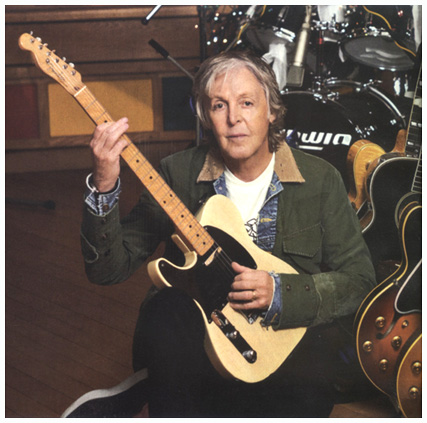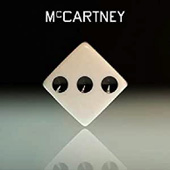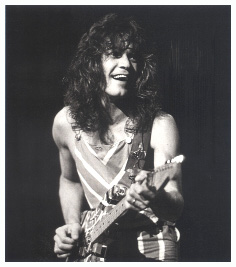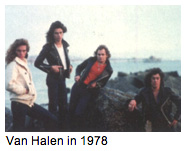![]()
| Third Time's (Still) a Charm |
|
Macca releases part three of his 'McCartney' trilogy.
Paul McCartney
McCartney III
Capitol
ROCK
By Alex Suskind in Entertainment Weekly

![]() s the world's biggest band was collapsing -- as John Lennon turned his attention to staging bed-ins and making erotic lithographs -- Paul McCartney decided he'd had enough. Following a brief sojourn at his farm in Scotland, he returned to London, where he wrote, recorded, and produced his first solo record in secret. Often referred to as a proto-indie album, the semi-eponymous, single-credited (outside of some backup vocals from wife Linda, it was a one-man show) McCartney was a stark departure from the maximalist pop-rock of the Fab Four's final works -- an optimistic, acoustic project made of meandering love anthems and intimate lullabies. It was, somewhat predictably, flayed by critics, who were perplexed by its lo-fi approach and half-baked songs. They also seemed miffed at a press release accompanying the record, which -- unbeknownst to the rest of the Beatles -- publicly announced McCartney's intentions to break from his three mates, a literal Dear John letter with millions of fans cc'd (the album was also released one month before the Beatle's swan song, Let It Be).
s the world's biggest band was collapsing -- as John Lennon turned his attention to staging bed-ins and making erotic lithographs -- Paul McCartney decided he'd had enough. Following a brief sojourn at his farm in Scotland, he returned to London, where he wrote, recorded, and produced his first solo record in secret. Often referred to as a proto-indie album, the semi-eponymous, single-credited (outside of some backup vocals from wife Linda, it was a one-man show) McCartney was a stark departure from the maximalist pop-rock of the Fab Four's final works -- an optimistic, acoustic project made of meandering love anthems and intimate lullabies. It was, somewhat predictably, flayed by critics, who were perplexed by its lo-fi approach and half-baked songs. They also seemed miffed at a press release accompanying the record, which -- unbeknownst to the rest of the Beatles -- publicly announced McCartney's intentions to break from his three mates, a literal Dear John letter with millions of fans cc'd (the album was also released one month before the Beatle's swan song, Let It Be).

|
Beyond the song credits, there is little through-line between the new album and its predecessors. The first and II sound like they were made by different artists: bare-bones guitar and piano on the former, a mélange of electronica and Krautrock on the latter. McCartney III fits somewhere in between the two -- a more straightforward, occasionally indulgent rock album about love, life, and future days.
Opener "Long Tailed Winter Bird" begins with a plaintive backwoods riff before building into something knottier. The guitar gets fed through a distortion pedal, dreamy birdcalls fade in, and a whispery falsetto appears: "Do you miss me?/ Do you feel me?"
On "Find My Way" McCartney takes notes from late-period Allman Brothers Band licks before adding harpsichord and horns, as if he walked around the studio trying out the same chords on different instruments until he found the one that fits. Meanwhile, "Lavatory Lil" is a rock stomper in the vein of past Beatles alliteratives like "Polythene Pam." There is a fair share of misses -- the unnecessarily long eight-and-a-half-minute "Deep Deep Feeling," the ironically surface-level lyrics of "Deep Down" -- but, like any contemporary project, III feels like comfort food.
Credit that voice, charming and unmistakable after decades of use. Hearing it anew is like curling up inside a warm blanket. Though McCartney's vocals have waned some with age, they still shine -- and, in some cases, surprise. On III, his smooth-as-silk tenor is often reduced to a humbled-but-powerful warble, pulsing through "Women and Wives," fluttering across "The Kiss of Venus." You can hear it again on the playful "Slidin'": "I know there must be other ways of feeling free/ But this is what I wanna do, who I wanna be," he sings. Thankfully, he's never changed his mind. ![]()

| Eddie Van Halen - 1955-2020 |
|
![]()
A real-life guitar hero who did what he wanted with only 12 -- no make that 28 -- notes.
By Dan Snierson in Entertainment Weekly

![]() ou only have 12 notes," Eddie Van Halen said. "Do whatever you want with them." What did he do with them? Just spin them into the most joyful hard-rock-metal-doo-wop-pop-back-to-pop ever blasted through a boom box; provide the soundtrack for wasted high school parking-lot hangouts and out-of-control backyard parties in the late '70s, '80s, and early '90s; and burnish a rep as the most innovative rock guitarist of the past 50 years.
ou only have 12 notes," Eddie Van Halen said. "Do whatever you want with them." What did he do with them? Just spin them into the most joyful hard-rock-metal-doo-wop-pop-back-to-pop ever blasted through a boom box; provide the soundtrack for wasted high school parking-lot hangouts and out-of-control backyard parties in the late '70s, '80s, and early '90s; and burnish a rep as the most innovative rock guitarist of the past 50 years.
Twelve notes? Nah. His chromatic scale must have had, like, 28. As Michael Jordan defied physical gravity, the founding axman of Van Halen -- who died Oct. 6 at age 65 from cancer -- defied sonic gravity, flurries of notes skittering every which way, squeals sailing to the heavens, whammy-bar dives craping the gates of Hades.  From "Eruption," his flag-planting, face-melting solo showcase on 1978's Van Halen, through oodles of romps and stomps like "Beautiful Girls," "Hot for Teacher," and "5150," Van Halen revolutionized the game with a pastiche of shimmery harmonics, blistering arpeggios, and slip-n-slide finger-tapping.
From "Eruption," his flag-planting, face-melting solo showcase on 1978's Van Halen, through oodles of romps and stomps like "Beautiful Girls," "Hot for Teacher," and "5150," Van Halen revolutionized the game with a pastiche of shimmery harmonics, blistering arpeggios, and slip-n-slide finger-tapping.
But he was far greater than the sum of his pyrotechnics. Van Halen played with exuberance, ease, and feel -- elements lacking in his wannabe rivals' robotic fretwork. While the solos grabbed the headlines, Van Halen wrote compelling musical stories underneath; he was a superb riff-rhythm player. His songwriting chops, when commingled with frontman David Lee Roth's and later Sammy Hagar's, begat catchy-as-hell fist pumpers. He could deliver soaring pop-rock ("Dance the Night Away," "Summer Nights") or chug through darker rock with swing and bite ("Man Street," "Unchained"). The Dutch-immigrant-turned Pasadena kid who never learned how to read music also impressed on keyboards ("Jump," "Right Now").
His legacy of licks extends beyond 80 million-plus records sold worldwide. Whether tapped to scorch up Michael Jackson's "Beat It," sampled on Tone Loc's "Wild Thing," or blasted at George McFly in Back to the Future, Van Halen was our go-to guitarist, the poster child for the guitar-god poster. Over the years, he battle alcoholism and cancer, but the band's final tour in 2015 featured a legend who could still sling it. On Mount Rockmore now rests the guy with the goofy grin and the red-and-white-striped guitar, just effortlessly reinventing the rules of rock, just doing whatever he wants with his 28 notes. ![]()
![]() Reader's Comments
Reader's Comments
No comments so far, be the first to comment.
